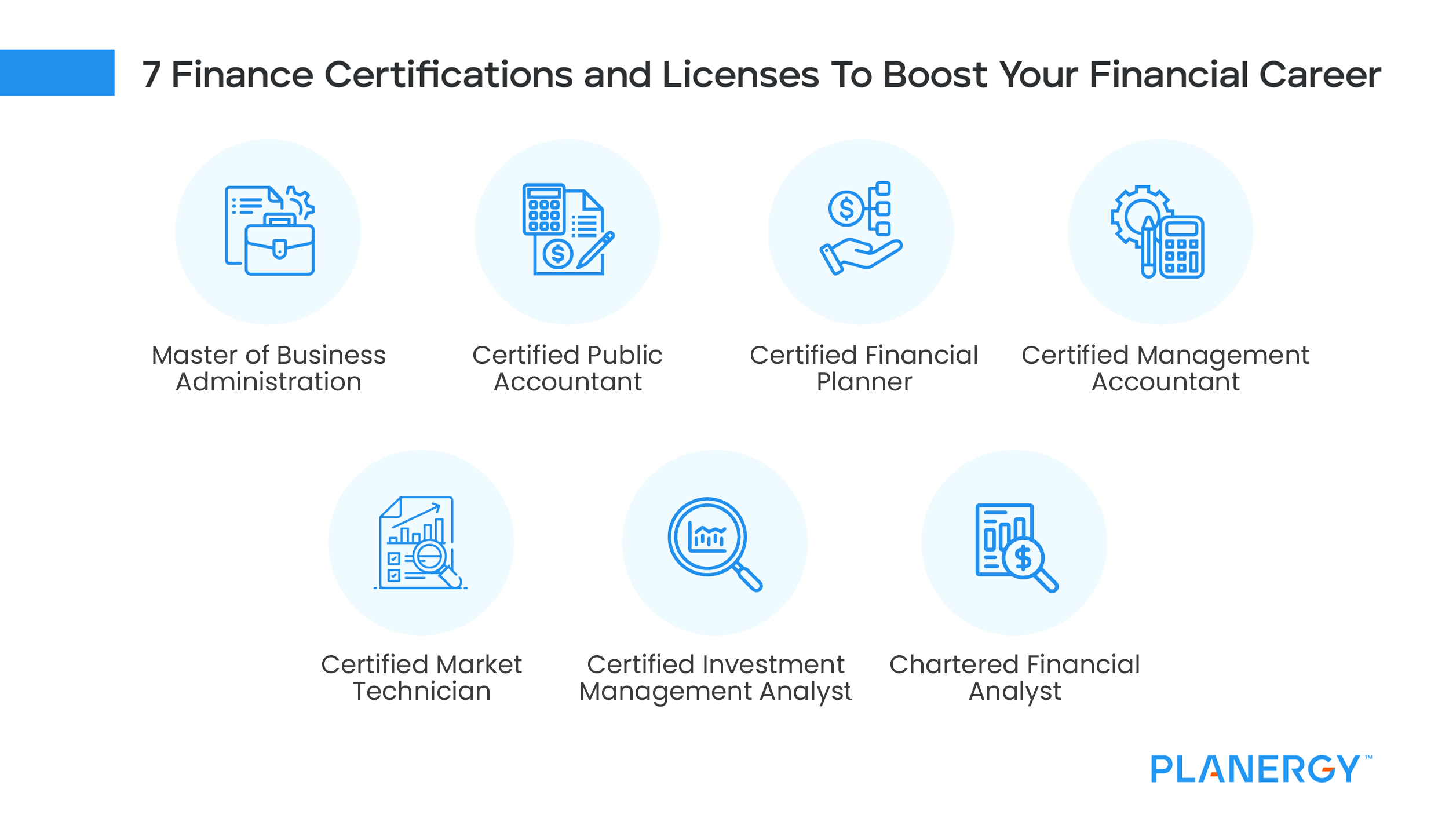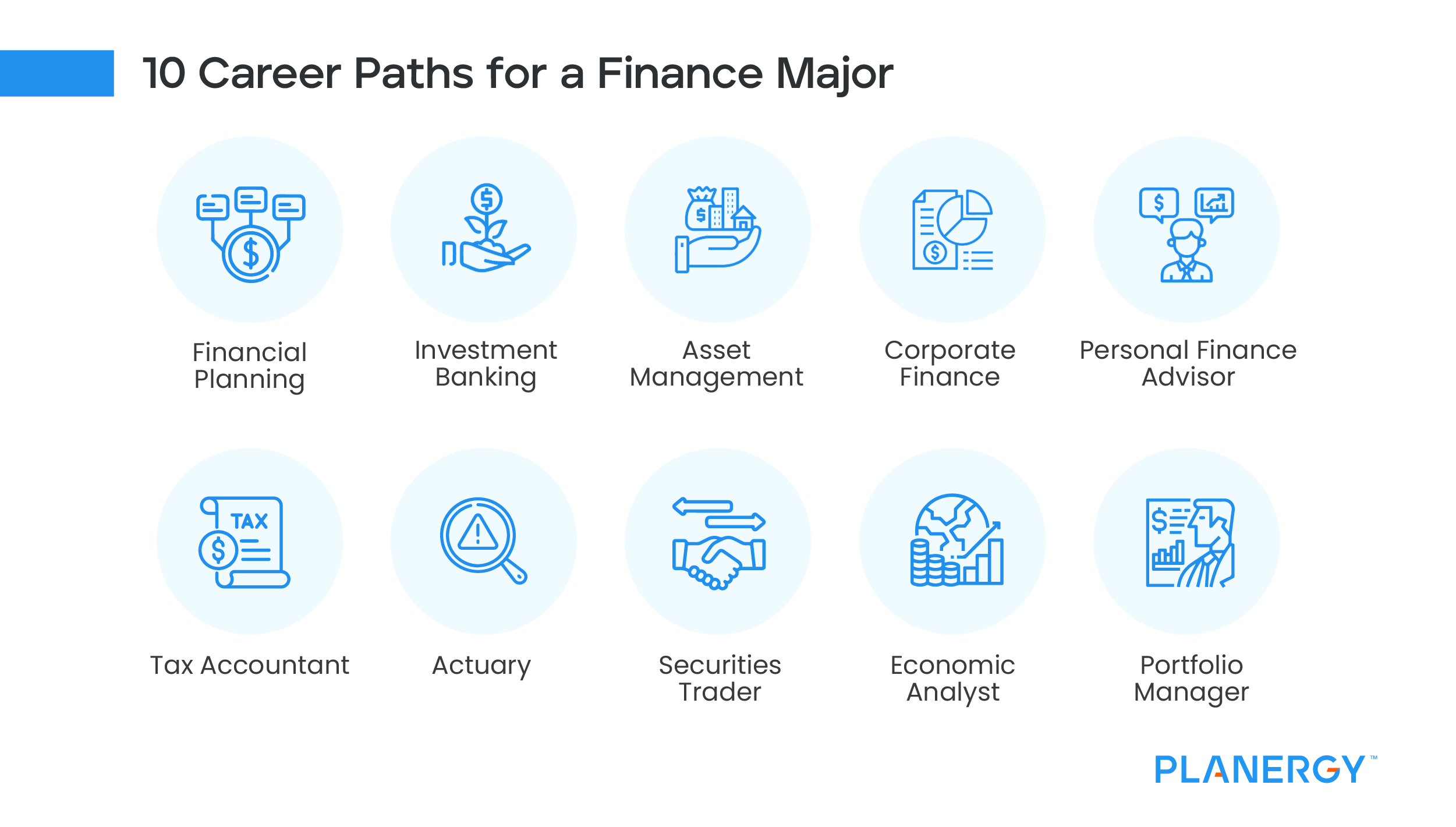The finance field can be a highly lucrative, financially rewarding career path. Most financial careers offer benefits such as good compensation, job stability, and career growth opportunities.
However, those new to the field may experience a high degree of competition from others, long working hours and a high-stress work environment.
Today, finance professionals can choose from a variety of careers including investments, banking, corporate finance and accounting, and international finance, where you’ll deal with monetary relations between numerous countries.
Even better, the U.S. Bureau of Labor Statistics has estimated that jobs such as financial analysts will grow by 12% through 2024, with finance jobs growing rapidly in both Europe and Asia as well.
What Are the Steps To Take To Begin a Finance Career?
Are you interested in starting down a finance career path but not sure where to begin? Let’s start with some basic qualifications for anyone interested in a finance career.
The majority of finance professionals have obtained a degree in one of the following fields:
- Finance
- Business management
- Economics
- Accounting
- Mathematics
While having a degree in another field doesn’t automatically exclude you from entering the finance field, you’ll have some additional work to do to get up to speed on the knowledge needed to thrive in this field.
You may also want to consider obtaining an MBA if you don’t already have one.
While not necessary, an MBA is attractive to many financial firms and is seen as a necessity if you’re pursuing a financial position outside of the U.S.
Another thing you can do is obtain financial certifications, which can make you a more attractive prospect to financial firms.
If you’re still in school and already know that you want a career in finance, there are numerous things you can do to take advantage of university or college resources right now.
- Take advantage of any networking opportunities that may come your way
- Try to get an internship at a financial organization
- Work on communications skills, multi-tasking, problem-solving, and relationship building
- Start exploring various certification options
If you’re entering the field right out of college, begin to build your resume.
Try to obtain an internship at a financial services firm or in the finance department where you can build on your skills and obtain professional experience since many certifications require both a college degree and a significant amount of finance-related work experience.
If you’re looking to make a career switch from another field, consider accepting an entry-level position or look into obtaining basic financial certifications before looking for employment.
7 Finance Certifications and Licenses
You’ll need at least a bachelor’s degree to get started in the field. But to boost your career trajectory, there are several certifications that you can obtain while on the job that can significantly boost your career.
-
Master of Business Administration
An MBA is one of the most widely recognized degrees you can receive. Designed to jump-start your financial management career, an MBA provides a broad-based skill set as well as a great way to hone communication and strategic thinking skills. Most universities offering a master’s degree in business require a standardized test such as GMAT or GRE for admittance.
-
Certified Public Accountant
If you’re more interested in public and managerial accounting, there is no better certification to receive than the CPA.
The CPA exam is notoriously difficult, with four separate parts including Auditing and Attestation, Business Environment and Concepts, Financial Accounting and Reporting, and Regulation. A CPA certification prepares an individual for a career in public accounting, tax planning, and tax preparation.
-
Certified Financial Planner
To take the CFP exam, you’ll need a bachelor’s degree, 6,000 hours of financial planning experience, or 4,000 hours of apprenticeship experience.
Those taking the CFP exam also have to adhere to both ethical and professional standards for financial planning. Becoming a CFP can enhance earnings potential, improve credibility, and open the doors to several financial career paths.
-
Certified Management Accountant
If your desired career path veers more towards management accounting, the CMA is a good certificate to obtain. A great certificate for accountants with their eye on management, the CMA requires a bachelor’s degree along with two years of professional experience in either financial or management accounting.
-
Certified Market Technician
Looking to advise others on the stock market and other investment options? The CMT is a good certificate to obtain since certification demonstrates mastery of investment risk and portfolio management.
The CMT is globally recognized and requires those obtaining the certification to abide by the CMT Association Code of Ethics and requires membership in the CMT Association.
-
Certified Investment Management Analyst
Considered the premier certification for financial advisors and investment consultants, the CIMA requires three years of financial services experience, an in-depth background check, and completion of the executive education course, with content provided by premier business schools such as the University of Chicago Booth School of Business, University of Pennsylvania Wharton School, Yale School of Management, and the Research Centre of University of Technology, Sydney.
-
Chartered Financial Analyst
CFA certification requires a bachelor’s degree, and four years of experience in an investment-related role. The CFA includes three exams, with each exam progressively more difficult. Widely recognized in financial circles, the CFA offers a solid path for career advancement.
There are several other financial certifications available to explore should you take this career path, with each offering an opportunity to advance your career.

Whether you’re a number cruncher, a strategic thinker, or a risk-taker, there are plenty of career options in the finance field to explore.
How To Decide What Role You’re Best Suited For?
As you can tell from the list of career paths listed above, there are several different directions you can go in once you decide on a career in finance.
But what if you’re not sure exactly what you want to do?
For example, if you were a finance or accounting major, what classes did you enjoy most? They may give you the best clue as to what financial path is best for you.
But there are other ways to determine where you’re best suited. Do you thrive in a high-pressure environment? If so, then trading may be a good option for you.
Do you like helping people achieve their financial goals?
There are a variety of options available to you from CPA to Certified Financial Planner.
Or if you like crunching numbers, preparing budgets, or are interested in tax preparation, you may want to concentrate on accounting.
10 Career Paths for a Finance Major
If you’re a finance major or currently pursuing a finance degree, there are numerous paths you can take. These are just a few of the areas you may choose to explore:
-
Financial Planning
Financial planners help their clients make the best financial decisions for their current situation. While some financial planners may focus on long-term financial strategies, others focus on stock trading and offer advice on individual stocks and bonds.
-
Investment Banking
Strong analytical skills are a plus if you’re interested in becoming an investment banker. Investment banking is an umbrella term for a variety of tasks including securities trading, financial advisory services, asset management, and mergers and acquisitions.
A difficult field to break into, be prepared to start at the bottom and work a lot of hours.
-
Asset Management
If your critical thinking skills are top-notch, asset management may be a good fit. Portfolio managers, economists, and analysts all fall under the asset management category, where top-notch analytical skills are a must.
-
Corporate Finance
If crunching numbers is your happy place, corporate finance may be the area for you.
Your finance degree can provide entry to a variety of finance and accounting jobs in the private sector including accountant, controller, finance director, cash management, investor relations, treasurer, and chief financial officer (CFO).
For more advanced career opportunities, consider sitting for the CPA exam, which allows you to work independently and choose your career path.
-
Personal Financial Advisor
A more specialized version of financial planning, a personal financial advisor works with clients to help them make better, more informed investment decisions.
While investments such as stocks and bonds are part of the job, personal financial advisors also provide their clients with advice on a variety of things including college savings, insurance, retirement, and estate planning.
-
Tax Accountant
While most tax accountants are CPAs, not every CPA specializes in tax accounting. For those that do, the first four months of the year can be insanely busy, but after-tax preparation is done, tax accountants can spend time with other projects, including tax planning for both businesses and individuals.
-
Actuary
Actuaries spend their day analyzing assembling and analyzing data to estimate the probability, with many of them working as an underwriter.
Actuaries are commonly employed by insurance companies, investment firms, and government agencies, using their expertise to help manage assets and minimize risk.
-
Securities Trader
If you love action, understand Wall Street lingo, and work well under pressure, a securities trader may be a good fit. Traders typically work at commercial banking institutes or investment firms or hedge funds, and private equity firms.
If you’re interested in this type of financial analysis, consider specializing in one specific trading area, such as stocks, bonds, commodities, or crypto.
-
Economic Analyst
If you have an analytical mind and are good at predicting trends, an economic analyst career may be for you. Money management firms and banks often employ economic analysts and are commonly found in government positions as well.
In most cases, to advance up the ladder, you’ll need an advanced degree, with most currently holding an MBA, although some have a Ph.D. in this very specialized field.
-
Portfolio Manager
Considered one of the most prestigious jobs in finance, a portfolio manager oversees institutional investments.
For example, a portfolio manager at an investment bank would provide money management advice and strategies to corporate clients and other large institutions including city, state, or federal government.

What Is the Difference Between a Financial Advisor and a Financial Planner?
Though financial advisors and financial planners both work with client funds, a financial advisor and a financial planner have very different priorities.
Financial planners are typically used when looking to create an complete financial strategy from scratch, while financial advisors are particularly useful for those looking for assistance with investments.
-
Financial Planner
A financial planner focuses more on the big picture, assisting clients in creating an investment strategy, while also addressing other financial issues such as tax liability, insurance options, and current risk level.
While they do help with investments, they also provide additional services such as tax planning to ensure that any tax benefits are taken advantage of while working to maximize gains from investments. Financial planners also assist clients with insurance planning for proper risk management.
Finally, a good financial planner also addresses retirement planning so clients will have the funds they need to finance their children’s educational expenses as well as retire comfortably.
-
Financial Advisor
Financial advisors focus their attention on client investments, providing advice to clients about which assets they should invest in while advising them about the potential risks and rewards.
Using a narrower focus, financial advisors concentrate on investments, identifying those that are a good match with their client’s personal finance goals.
They also consistently monitor client investment accounts and make recommendations based on either changing market conditions or changing client goals. Because of this, it’s recommended that financial advisors meet with their clients as least once per year, and perhaps more frequently should client or market circumstances change.
Is Finance Still a Good Career Path?
A career in the finance industry can be highly rewarding, and with the field continuing to grow, there are numerous job opportunities available.
However, a career in the financial industry can be stressful, dealing with fluctuating financial markets, demanding clients, and changing economic conditions, along with the need to stay abreast of any new developments in the field.
Whether you’re a number cruncher, a strategic thinker, or a risk-taker, there are plenty of career options in the finance field to explore.
So, hone up on your interpersonal skills, perfect your decision-making capabilities, and make the move to finance or a related field today.




